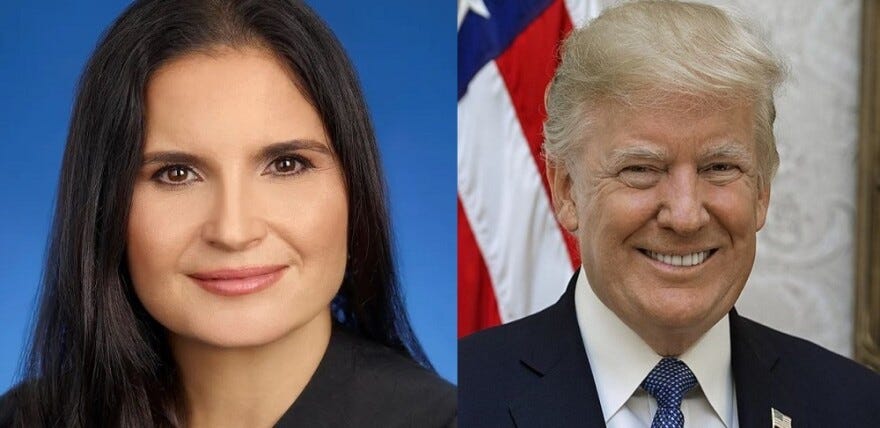On July 1, when the Supreme Court issued its opinion concerning Presidential immunity, Justice Clarence Thomas wrote in his concurring opinion:
“I am not sure that any office for the Special Counsel has been established by law as the Constitution requires.”
For Justice Thomas, “is no law establishing the office that the Special Counsel occupies,” then Special Counsel Smith is not “duly authorized” and “he cannot proceed with this prosecution.”
Today, Judge Cannon, who is overseeing Special Counsel Jack Smith’s case against Donald Trump, et al., in the Southern District of Florida, took those arguments to their logical conclusion and dismissed the Special Counsel’s case against Trump.
According to Judge Cannon’s order and memorandum:
“The Superseding Indictment is DISMISSED because Special Counsel Smith’s appointment violates the Appointment’s Clause of the United States Constitution.”
To reach this conclusion, Judge Cannon had to answer a threshold question: whether there is a statute in the U.S. Code that authorizes Special Counsel Smith to conduct the prosecution. For Judge Cannon, “the answer is no.”
Key to Judge Cannon’s order was Article II of the Constitution, which provides the Executive with the exclusive means of appointment Officers of the United States. As Justice Thomas wrote, before the President (or the Attorney General) can appoint any officer, “the Constitution requires that the underlying office be established by law” – meaning the underlying office has been created by Congress “by statute.”
In their briefing before the court, the Special Counsel argued that a number of general laws give the Attorney General broad powers to appoint inferior officers. Judge Cannon dismissed these arguments, stating:
“None of the statutes cited as legal authority for the appointment . . . gives the Attorney General broad inferior-officer appointing power or bestows upon him the right to appoint a federal officer with the kind of prosecutorial power wielded by Special Counsel Smith.”
If you look closely, this follows the observations of Justice Thomas (which served as a roadmap for Judge Cannon) just a couple weeks back, when he said: “None of the statutes cited by the Attorney General appears to create an office for the Special Counsel, and especially not with the clarity typical of past statutes used for that purpose.”
Judge Cannon expanded upon the issue of “clarity” brought up by Justice Thomas, stating that Congress must “speak clearly” – something it did not do in the statutes Special Counsel Smith argued allowed his appointment. The problem for Special Counsel Smith has always been that none of the statutes purported to authorize his appointment actually vest Attorney General Garland with the power to appoint a Special Counsel. To her credit, Judge Cannon conducted a thorough analysis of the laws cited by Special Counsel Smith (starting at page 22) and found the Special Counsel’s textual and historical arguments to be wanting.
Judge Cannon further elaborated if the Special Counsel’s arguments concerning statutory interpretation be accepted, then this would “displace the Senate from its ordinary and longstanding role in confirming United States Attorneys and give to the Executive seemingly unchecked power to create offices for outside prosecutors beyond the scheme designed” in the U.S. Code. It would “erode” basic separation of powers principles and “destabilize” the DOJ structure created by Congress.
Of course, this wasn’t the first time Special Counsel Smith has pursued novel legal theories to advance his agenda – his record before the Supreme Court, even before Trump v. U.S. – proves as much.
This is another issue seemingly destined for the Supreme Court – that is, after the Eleventh Circuit considers it. How will the case ultimately resolve?
Once it gets to the Supreme Court, we’re not sure they will agree with Judge Cannon. Though no justices joined Justice Thomas’s concurrence in Trump v. U.S. Granted, that might be because the appointment issue was not exactly before the Supreme Court. Regardless, from our vantage point, it’s hard to see Justices Roberts and Kavanaugh and Barrett agreeing with Justice Thomas on this issue.
But in the end, it may not matter – the case may not get to the Supreme Court. This issue concerning the legality of Special Counsel Smith’s appointment will not be resolved until after the November 2024 election.
It’s another loss for Special Counsel Smith – and a huge win for Trump.
Alternatively…. How does the Attorney General Garland and the DOJ fix this problem and avoid the lengthy appeals process?
They could very well refile the indictment through a US Attorney with proper authority. In the Southern District of Florida, that would be US Attorney Markenzy Lapointe.




So if this ruling eventually stands ... why wouldn't it apply to all the Robert Mueller SCO cases too? He was never Senate confirmed either.
Wheels coming off this lib commie corrupt criminal gang